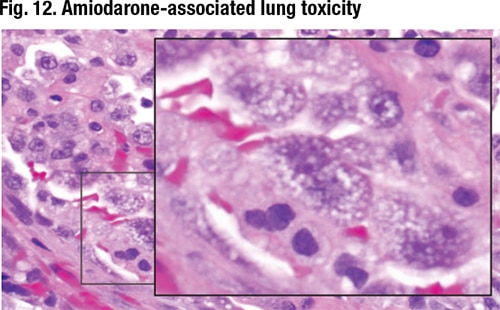June 2019—It took David Ledbetter, PhD, a mere six years or so to become a hero. Dr. Ledbetter, executive vice president and chief scientific officer, Geisinger, had helped oversee the expansion of the health system’s MyCode precision medicine project, which began as a traditional research biobank in 2007.
Read More »June 2019
ME multiplex panel: debating the tradeoffs
June 2019—Meningitis and encephalitis have been called by some the most terrifying diseases in medicine, in part because of the difficulty of diagnosing their underlying pathology. The clinical stakes of laboratory testing are high for diagnosing and treating the inflammation that meningitis/encephalitis (ME) causes within the central nervous system.
Read More »Sidestepping pitfalls in diagnosing interstitial lung disease
June 2019—The pathologic approach to evaluating specimens as part of a workup for medical lung disease demands a different strategy than is typically used for the patient with a question of neoplasia, says Brandon T. Larsen, MD, PhD.
Read More »Path to importance of PD-L1 status in breast cancer
June 2019—New data support testing patients for their PD-L1 immune cell status when they are diagnosed with metastatic or unresectable locally advanced triple-negative breast cancer to determine if they might benefit from a checkpoint inhibitor.
Read More »Earlier HIV detection with prototype Abbott assay
June 2019—Abbott unveiled a new and improved fourth-generation prototype HIV assay at the 2019 HIV Diagnostics Conference in March. In an Abbott-funded study, the prototype assay was compared with the fourth-generation Abbott Architect HIV Ag/Ab Combo and Roche Elecsys HIV Combi PT run on the Cobas e602.
Read More »Bladder cancer detection and surveillance: How urine cell-free DNA stacks up against cytology
June 2019—A high-throughput sequencing panel was found to be more than 90 percent sensitive in detecting urinary tumor DNA in early-stage bladder cancer and in post-treatment surveillance. The approach, reported in April in Cancer Discovery, overcomes some of the challenges urinary cell-free DNA analysis poses, said one of its developers, and is far more sensitive than cytology and cystoscopy.
Read More »Talking tests, instruments, and what’s best where
June 2019—Analyzers, menus, test distribution, and middleware were the topics of a roundtable led in April by CAP TODAY publisher Bob McGonnagle. Samuel McCash, MD, Frederick Kiechle, MD, PhD, Christina Reita of Roche, and Mimi Dang of Tosoh talked IT, turnaround time, and what challenges stand out. Here is what they told us.
Read More »Put It on the Board
Minimum set of alleles recommended for clinical CYP2C9 genotyping
June 2019—A joint report from the CAP and the Association for Molecular Pathology was published last month to aid in the design and validation of clinical CYP2C9 assays, promote standardization of testing across different laboratories, and improve patient care. The report, “Recommendations for Clinical CYP2C9 Genotyping Allele Selection: A Joint Recommendation of the Association for Molecular Pathology and College of American Pathologists,” was released online ahead of publication in the Journal of Molecular Diagnostics. The AMP Pharmacogenetics Working Group is developing a series of guidelines to help standardize clinical testing for frequently used genotyping assays. Developed with organizational representation from the CAP and the Clinical Pharmacogenetics Implementation Consortium, the latest report follows a set of recommendations for clinical CYP2C19 genotyping allele selection published in May 2018.
Q&A column
Q. Is there a specific CAP recommendation regarding which anticoagulants are acceptable for synovial fluid crystal analysis? If not, what does the CAP recommend? Read answer. Q. What is the next step in resolving platelet clumping when it also occurs in a citrate tube? Read answer.
Read More »Newsbytes
June 2019—How Orchard Software is helping labs address transgender care: Establishing useful reference ranges for cisgender patients can be difficult, and for transgender patients it can be even more challenging. Add to this the desire to show the reference ranges for transgender patients as separate categories, distinct from the values for male and female patients, and the challenges mount for some medical centers. Read more.
Read More »From the President’s Desk: Best-kept secret in medicine
June 2019—I wasn’t one of those kids who always knew they wanted to be a doctor. Science was a powerful draw, which might have suggested medical school if my sister hadn’t gotten there first. But she did, so I majored in chemistry at Vanderbilt. As an undergraduate with little money, I hoped to fast-track, so I found a summer job anesthetizing laboratory rats in the middle of the night and removing their kidneys. The work supported a group studying the renin-angiotensin system. They thought I had a knack for surgery, which prompted a reassessment of my chemistry major and eventually led to an application to medical school. Life makes choices for us sometimes, and I was lucky that way.
Read More »Clinical pathology selected abstracts
June 2019—Dietary patterns during adulthood and cognitive performance in midlife. Cognitive impairment is associated with an increased risk of mortality, disability, and late-life dementia, which contributes to the rising costs of health care. Several studies have demonstrated cognitive decline in midlife, and some data have linked this decline to cardiovascular disease risk factors or a more sedentary lifestyle. Diet is a modifiable exposure, but few studies have analyzed the risk of cognitive impairment due to dietary factors.
Read More »Anatomic pathology selected abstracts
June 2019—Markers for differentiating triple-negative breast cancer from TTF1-negative lung adenocarcinoma. Triple-negative breast cancer patients have an increased risk of developing visceral metastases and other primary nonbreast cancers, particularly lung cancer. The differential diagnosis of triple-negative breast cancer (TNBC) metastases and primary cancers from other organs can be difficult due to lack of a TNBC standard immunoprofile.
Read More »Molecular pathology selected abstracts
June 2019—Link between immunogenic neoantigens derived from gene fusions and T-cell responses. Immunotherapy is quickly emerging as an important therapeutic strategy for hematologic and solid tumors. In principle, immune cells recognize unique non-self antigens expressed by cancer cells and this serves as the initial step in eliminating such cells. Among the metrics used to assess the likelihood of response to immunotherapy is the presence of a high level of somatic mutations, referred to as tumor mutation burden (TMB). This serves as a surrogate for extrapolating the level of neoantigens ex- pressed by cancer cells.
Read More » CAP TODAY Pathology/Laboratory Medicine/Laboratory Management
CAP TODAY Pathology/Laboratory Medicine/Laboratory Management







